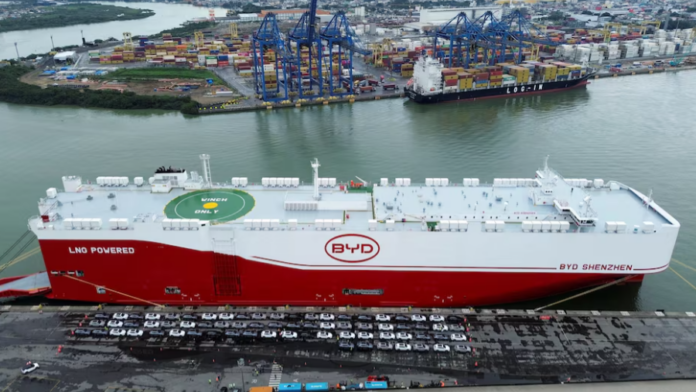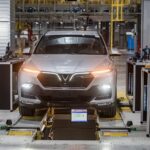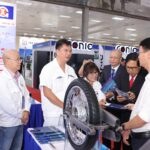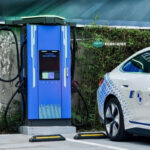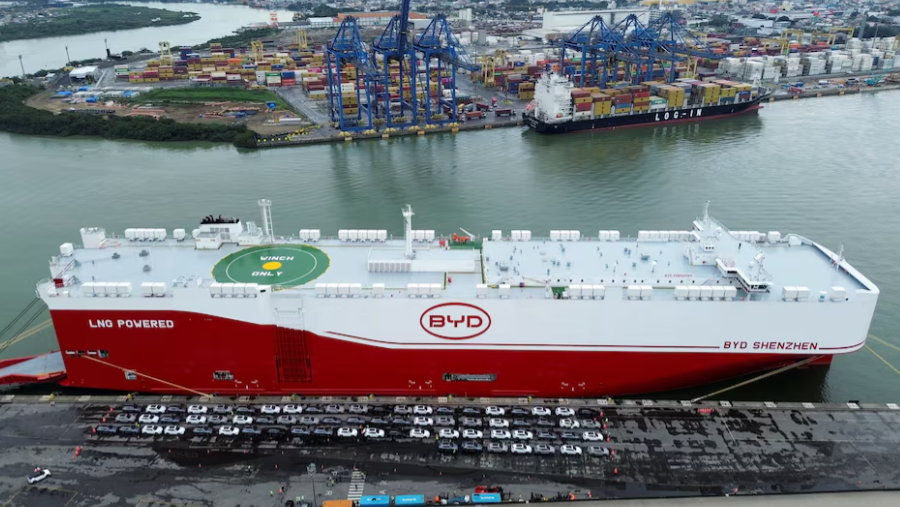
Illustrative image
The world’s largest car carrier ship, with a capacity equivalent to 20 football fields, completed its maiden voyage in late May, docking at the port of Itajai, Brazil. However, the arrival of this vessel seemed less than welcome.
This ship is owned by BYD, China’s leading manufacturer of electric and plug-in hybrid vehicles, and is part of their strategy to boost exports. According to Reuters’ analysis, the recent voyage was BYD’s fourth trip to Brazil this year, bringing the total number of imported vehicles to approximately 22,000.
BYD is offering its vehicles at competitive prices in Brazil as the green vehicle movement in this South American country is still in its early stages. Industry associations and unions fear that the influx of Chinese vehicles, particularly from BYD, will put immense pressure on the domestic automotive industry and threaten local jobs.
The Brazilian Automotive Association (ANFAVEA) predicts that imports from China could increase by nearly 40% this year, reaching 200,000 vehicles, which equates to about 8% of registered light vehicles.
Industry groups argue that China is taking advantage of low tariffs to boost exports instead of investing in local manufacturing facilities in Brazil. They are urging the government to raise import taxes on electric vehicles (EVs) from the current 10% to 35% within a year, rather than following the planned timeline until 2026.
“The world is starting to close its doors to Chinese cars, but Brazil isn’t,” said Aroaldo da Silva, president of IndustriALL Brazil. “China is taking advantage of that.”
The increased presence of Chinese vehicles in Brazil coincides with a significant rise in automotive exports from China globally. In 2023, China surpassed Japan to become the world’s largest automotive exporter.
Brazil, the sixth-largest automotive market globally, is an attractive destination for Chinese automakers due to its large population and supportive policies for green vehicles. However, traditional manufacturers like Volkswagen, GM, and Stellantis have already established their presence there for decades and invested in local production.
Meanwhile, BYD’s plans for localizing production are facing delays. Initially, BYD was expected to start operations at its purchased factory in the state of Bahia in 2025. However, labor investigations at the construction site have pushed back the timeline to late 2026.
Similarly, Chinese automaker GWM is also a year behind schedule in operationalizing its purchased factory from Mercedes-Benz.
Brazilian officials and unions express concern that the surge in imports could undermine the incentive to invest in local production.
“We support new brands coming in, investing, creating jobs, and bringing new technology to Brazil,” said Igor Calvet, president of ANFAVEA. “But if imports surge and production stalls, that’s worrying.”
Da Silva from IndustriALL stated that the union has not witnessed BYD signing any contracts with local suppliers, which is customary within 18 months of production.
“Even if they have a factory here, if all the parts and technology are imported, what’s the real value?” he questioned.
The government of President Lula da Silva is committed to protecting jobs and the environment as part of its industrial revival and green stance ahead of COP30 in November. However, over 80% of EV sales in Brazil still come from imported Chinese vehicles, according to the Brazilian Electric Vehicle Association (ABVE).
Brazil has significant potential due to its possession of essential minerals like lithium, but it lacks the infrastructure to produce the entire electric vehicle supply chain, according to Ricardo Bastos, Government Relations Director at GWM and President of ABVE.
GWM is expected to commence production of the Haval H6 SUV model in July, with a capacity of 50,000 vehicles per year, and is negotiating with approximately 100 Brazilian suppliers.
“This year, imported and domestically produced vehicles will compete,” said Bastos.
“The End of ‘Nut-and-Bolt’ Blues: Can VinFast, as the ‘Leader’, Replicate Toyota’s Miracle?”
Toyota’s rise to prominence in Japan is nothing short of remarkable. With only three main factories, they’ve managed to establish thousands of auxiliary facilities, becoming a true powerhouse in the automotive industry.
China Turns Away: A Rival’s Windfall: Import Surge of 73% in Just One Month as a Bumper Crop Looms
The savior has spoken, and the soybean trade with China has flourished. A staggering 73% increase in just one month is a testament to the power of this game-changer.


























